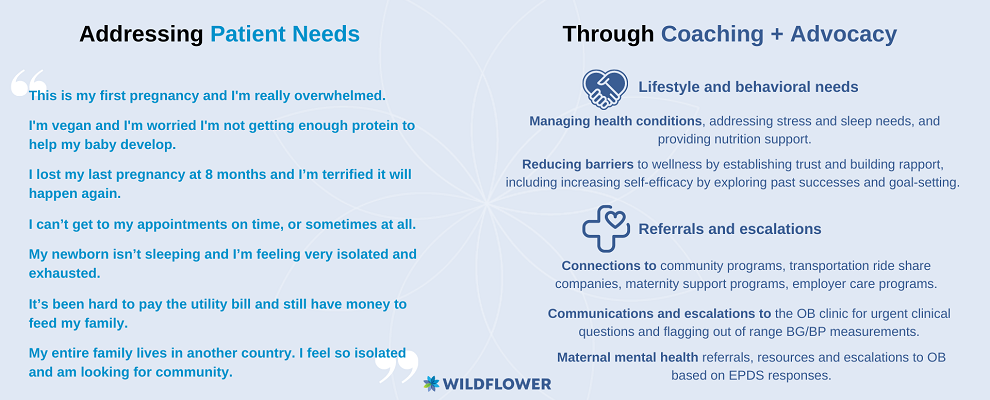Categories:

Offering the opportunity to connect: How Health Coaches create a safe space for maternity patients
The perinatal period is a whirlwind of physical and emotional changes, myriad of appointments, and a great many unknowns. While often portrayed as a blissful time, the reality is that pregnancy and postpartum can be an incredibly overwhelming and isolating experience. Let’s not forget that there are innumerable structural barriers in place that make accessing proper care far too steep for far too many. To circumnavigate certain limitations to care, Health Coaching offers the opportunity for patients to personally connect with not only a health professional, but another human.
Wildflower augments our digital capabilities by providing Health Advocates and Health Coaches, who serve as an extension of clinical teams and as the human touch that complements our platform. A Health Coach is a trained professional who leverages behavior change to support a patient’s self-efficacy in creating and moving towards the patient’s own desired habits and mindsets. The coaching relationship promotes a growth mindset which increases the capacity for positive change. In every interaction, patients are encouraged to show up as they are and be themselves, without being told what to do - because let’s be real - being told what to do helps nobody, ever!
Working together: The patient, coach, and provider
Successful coaching hinges on deep listening skills, and focuses on reflecting and affirming a patient’s strengths. For instance - the patient expresses that they’re feeling nervous about baby coming. That indicates they’d like to feel more grounded in the unknown, and we can discover together:
-
What does the patient have within their control at this time?
-
What has helped the patient in previous high-anxiety times to feel more confident?
-
Can the patient and coach work together to create a check-list of things to do before baby’s arrival?
While it isn’t up to the coach to solve problems, offering solutions and encouraging actionable steps, or simply holding space for emotions, can create a domino effect of positive change.
In creating an environment based on trust, a key part of the coaching relationship is addressing the patient’s current life situation, and what resources their care team can provide. Enter Maslow’s Hierarchy of Needs. Did the patient disclose that they can’t keep food on the table? Let’s explore why and see what the coach can do, such as referring the patient to case management or leaning on a Wildflower Health Advocate’s expertise in resources and local support programs. It is crucial that the coach maintain the boundaries of their profession, and this highlights the importance of relationships with other care providers. We can’t talk about coaching within the medical landscape without mentioning the very special symbiosis between a patient’s Health Coach, Health Advocate, and their OB, which is key to the care coordination model powered by Wildflower.

Meeting the needs of moms: On-demand coaching
Most coaching programs tend to be fairly structured and contractual: there’s a meet and greet between patient and coach that leads to setting up a future appointment date for a planned coaching session. Wildflower Health Coaches do follow this model, while also seeing success outside this sometimes limiting paradigm, now with coaching sessions on-demand.
Considering that pregnant patients attend between 10-15 appointments before giving birth, understanding that time and energy is required for planning these many appointments, and realizing these patients already lead very busy lives, Wildflower saw the need to offer impromptu coaching sessions.
Wildflower’s Health Coaches and Health Advocates can message live with patients in their Wildflower mobile or web app’s Message Center. It’s an in-app chat tool where patients can ask questions and get trusted answers. From a Message Center conversation, a coach can move that conversation into a coaching session right there in the app or switch to a phone call, per the patient’s preference.
Veering from the traditional model of coaching, on-demand sessions have proven to be a hit among busy moms and moms-to-be. It has been particularly successful with our Medicaid population, where fewer resources may impact a patient's ability to alot time in their day for a scheduled session. Fast contact with patients (rather than waiting days or weeks for a coaching session) allows for targeting greater needs more quickly and more frequently throughout the perinatal period.
After all, coaching is all about meeting the patient wherever they are in their health journey. We can see directly how broaching real issues in real time can be a boon to patient health outcomes.
No matter how coaches connect with patients - digitally, telephonically, immediately, scheduled - building rapport is at the core of the relationship. It is the coach’s job to create a safe, judgment-free space. Conversations open up when trust is built, allowing the coach to learn more about a patient’s unique set of needs. This open communication paves the way for greater outcomes in the medical landscape, especially in women’s health.
If you and your organization are looking for the unique and vital support Health Coaches can provide, contact us to learn more about where Wildflower’s team of coaches, advocates, lactation consultants and doulas fit within your care team.
Wildflower augments our digital capabilities by providing Health Coaches and Advocates who serve as an extension of clinical teams and as the human touch that complements our platform. To access a document about our Health Coaching and Advocacy capabilities and support, provide your information below.